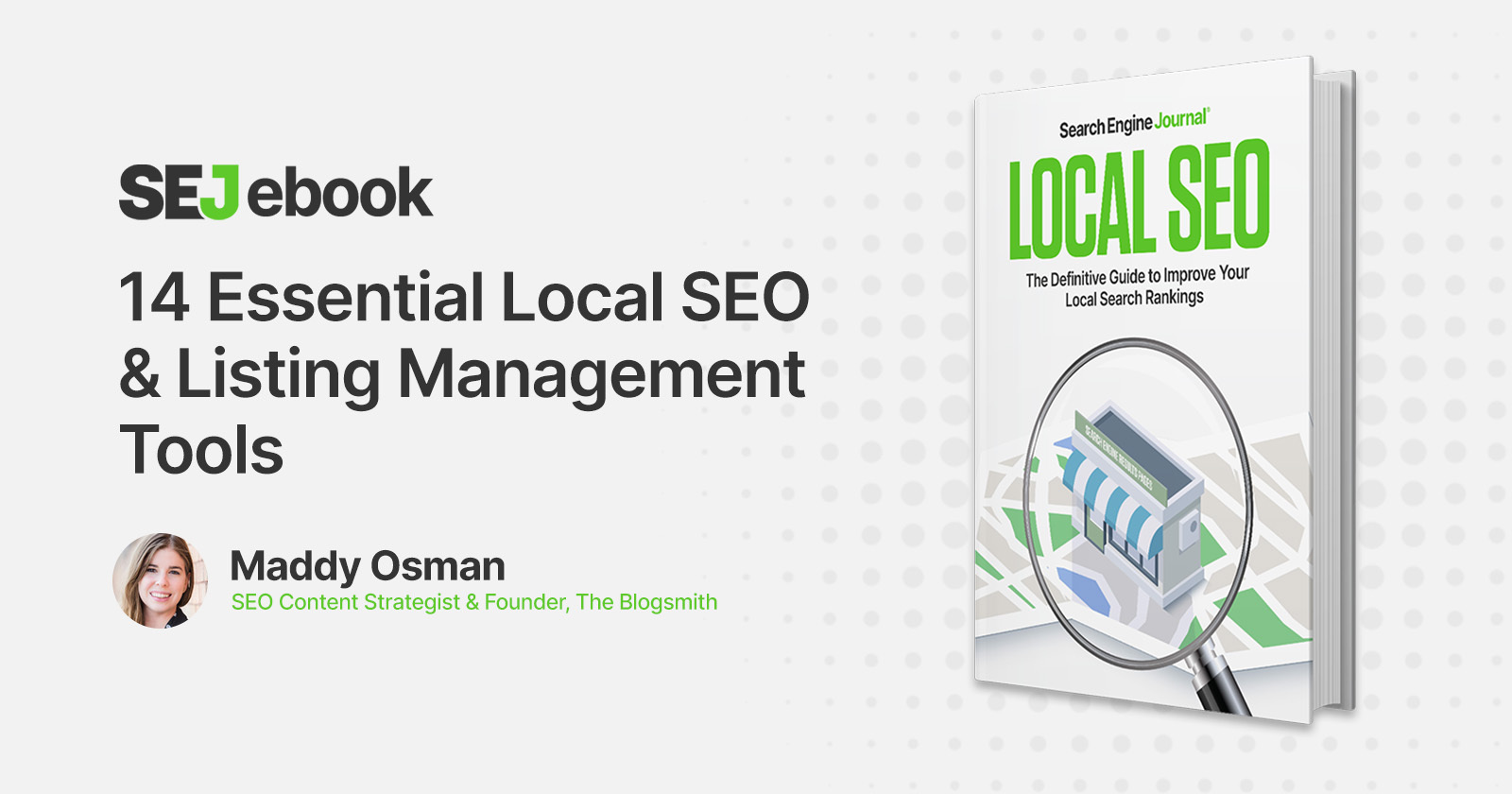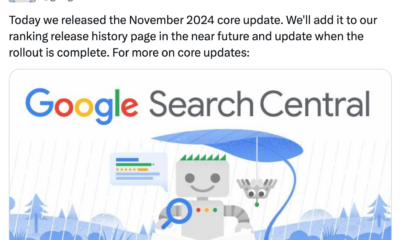SEO
14 Essential Local SEO & Listing Management Tools

Whether you operate locally or globally, a strong local SEO presence is key to driving more customers to your store, especially when your business has physical locations.
It may seem strange for brick-and-mortar stores to focus on developing their online presence until you realize that the majority of customers use the internet to learn about a company.
For instance, at the height of the pandemic in March 2020, more than 50% of shoppers searched online for open or closed stores.
Local SEO is now part of the “new normal.”
The good news is, there are local SEO tools you can use to help make keeping your business relevant and improving its visibility in organic and Map Pack results a lot more efficient.
Partner these with local listing management tools, and you’ll be ahead of the competition.
Local SEO tools help you:
- Automate rank tracking.
- Conduct local keyword research.
- Discover competitor insights.
- Monitor performance.
In addition, local listings management tools give businesses with brick-and-mortar locations a single space to manage and update location data on their online platforms.
Here’s a selection of local SEO tools and local listings management tools for businesses of all sizes that you’ll want to check out.
Local SEO & Listings Management Tools
1. Whitespark
Once a web design agency, Whitespark also offers SEO software tools to help businesses with local search marketing.
The Citation Finder tool is Whitespark’s most popular offering. It helps you find the citation opportunities you’re missing to improve relevant local search rankings.
The tool is free to use for three searches/day and limited search results – perfect for those exploring the tool.
Paid subscriptions start at $33/month when billed annually for five campaigns, 20 searches/day, and unlimited search results.
Other notable Whitespark local SEO tools include:
Local Rank Tracker
This uses precise location settings to give insight into overall SEO performance.
Whitespark’s local rank tracker gives you insight into the top 100 positions in local search – giving you a fuller picture of how you stack up against competitors and how you rank across popular search engines – as well as how you rank in different result types.
Reputation Builder
This prompts customers (via email or SMS) to share reviews on your review sites of choice (Whitespark supports over 100 online review websites).
It also calculates NPS (Net Promoter Score), a business indicator of your customer’s experiences with your business.
Moreover, the feature also lets you respond directly to Google reviews and Facebook recommendations.
Review Monitoring
This alerts you if and when you get a bad review so you can immediately take action.
2. Yext
Yext provides various solutions to help brands improve local SEO.
Yext integrates with hundreds of directories to ensure your business information and data are always up-to-date.
Some of Yext’s popular local SEO tools include:
Knowledge Manager
Answers to consumers’ common questions about your business, including staff, store hours, locations, and promotions.
Yext Pages
A system for updating listings to ensure the information provided is accurate.
Yext Pages are optimized to appear in search engines to help give customers more information about your brand’s nearest locations.
Yext Listings
Yext’s local listings management tool integrates with a large network of maps, apps, search engines, and social networks so customers can easily find your business.
You can use this feature for scheduled and real-time updates, analytics, finding listing improvement suggestions, and setting up integrations with other tools.
Additionally, Yext’s services and solutions include:
- Analytics: Collecting insights, activity, and data for easier reporting.
- Duplicate listing prevention.
- Data cleansing to keep facts consistent.
- Google Business Profile (GBP) and Listings management. Make updates through the platform and publish to GBP at any time.
Plans start at $199/year.
3. ReviewTrackers
Trusted by brands like Benihana and American Family Insurance, ReviewTrackers is a customer review software tool that sends alerts regarding customer feedback on various review websites, compiling the information in one helpful dashboard.
Using ReviewTrackers, you can:
- Solicit feedback from customers.
- Monitor reviews from various sources (e.g., Google, TripAdvisor, Yelp).
- Track location performance.
Prices available upon request.
4. Moz Local
Moz Local is perhaps the most popular local SEO tool on this list.
You can trust its data and methodologies after being in business for over 10 years and trailblazing the SEO software market.
Moz Local works for small and enterprise businesses, ensuring online listings are correct and consistent, which helps to boost website visibility.
When you use Moz as a local listing management tool, you only must create a listing once – it automates the rest of the process for you.
Moz works by sending your listings to major search engines, apps, directories, and business data aggregators. If you ever need to edit your listing, log back into Moz Local to make a change – you don’t have to edit listings on each directory individually.
Other notable Moz Local features include:
- Google and Facebook integration.
- Automated duplicate deletion.
- Social posting.
Moz Local will notify you when you receive new reviews on major platforms, thus empowering you to reply to customers promptly.
Besides the features that help boost your brand name in local search, Moz also gives you location-centric reports to help track your growth and determine key consumer interactions on your listings.
Pricing for Moz Local starts at $129/year – note that this pricing doesn’t include access to Moz’s popular SEO services.
5. Synup
Synup is an all-in-one local SEO tool tailored to help your marketing efforts. It lets you manage listings, monitor analytics, and create reports.
Specifically, Synup facilitates unlimited listing updates and immediately notifies you when your business receives new reviews. You can also automatically respond to reviews from within the tool.
Synup’s features also include:
- Automatically syncs business and location data across websites.
- It lets you manage industry and niche-specific sites.
- Crawls over 200 local search engines and directories to catch inconsistencies.
Synup costs $30 per location for the first 25 locations at the time of publication, with pricing scaling down as you add on more locations.
6. Semrush Listing Management
Favored by eBay, HP, and Quora, Semrush is a popular search analytics and local SEO software tool.
Semrush developed a local listing management tool in collaboration with Yext. You can use it to manage your listings, reviews, and local pages.
Semrush’s tool uses Yext’s Knowledge Network to publish data across platforms like Facebook, Foursquare, and TripAdvisor.
You can manage information from the Semrush listing management dashboard.
The tool is easy to use. You first have to input the data and find your location.
The tool will present a list of your listings and their status per directory website. After you make any necessary edits, Semrush will automatically update your listings accordingly.
The listings tool is only available to Semrush users in five countries – U.S., U.K., Australia, Germany, and France.
To sign up for this new Semrush feature, you’ll need a Semrush plan (which starts at $99.95/month), then add $20/month per location.
7. BrightLocal
BrightLocal is a popular local SEO tool used by more than 62,000 agencies, businesses, and freelancers for analytics and reporting functions.
Top features of BrightLocal include:
- Customized location dashboard to monitor data.
- Track organic, local, and mobile search rankings.
- Clean up and build citations.
- Monitor online reviews across 20+ websites.
- Scan and audit directory sites to determine necessary updates.
- GBP and NAP audit.
- White label solution for agencies.
Prices start at $29/month for a single business.
8. Advice Local
Advice Local is another local listings management tool that competes with the likes of Yext for the most number of directories supported.
It also offers standard digital agency services (SEO, digital marketing, and website development).
But the company typically works with agencies, resellers, and partners, instead of directly with local businesses.
That said, Advice Local’s advantage over Yext is you can manually build out local citations while Yext uses an API.
However, it takes a bit longer for Advice Local to get above an 80% score for local directory submissions, and the information supported is limited to the basics of NAP (name, address, phone number).
Moreover, Advice Local is a complete all-in-one local SEO solution (unlike Yext, which is more directory-focused).
Prices available upon request.
9. Birdeye
Trusted by 70,000+ businesses, including BMW and Nissan, Birdeye offers multi-location enterprise businesses a bird’s-eye view to local SEO. Businesses can monitor the customer experience and manage reviews.
What makes Birdeye different from other local SEO tools is its messaging platform, which supports multiple modes of communication.
That enables businesses to take an omnichannel approach to attract leads and convert and delight customers.
Birdeye’s features include:
- Data integration: Collate data from several websites into one dashboard for more efficient monitoring.
- Review management: Collate and handle reviews from 200+ platforms.
- Messaging platform: Birdeye supports text messaging, email, webchat, live chat, and chatbots. All messages come in through one inbox to manage all customer experiences.
Prices available upon request.
10. Rio SEO
Rio SEO is a local SEO tool that increases your online visibility, grows ecommerce, and drives in-store revenue for enterprise brands worldwide.
This local listings management tool is powered by its Open Local Platform, which boasts one of the largest directory support.
Businesses can integrate with over 170 top directories while giving brands insight and control.
Its local marketing content creation and optimization tools drive online visibility and engage consumers throughout the local search ecosystem.
Rio SEO has also analyzed aggregate Google Business performance metrics from over 200,000 U.S. business locations managed in its platform.
It releases notifications with benchmarks for metrics like Search Views and Clicks to Call each month.
Prices available upon request.
11. Chatmeter
Chatmeter is a local SEO tool that helps multi-location brands monitor their online listings, reviews, and social media.
Its local listings management tool helps you identify the areas that need improvement.
It empowers you to add photos, menus, services, and other Google attributes to enhance your listings. You can also edit your listings in bulk.
Other features include:
- Local SEO tracking tool to execute your local “near me” strategy.
- Local Brand Visibility (LBV) score to measure your brand’s online presence against competitors.
- Pulse, a text and sentiment analysis engine that lets you measure customers’ sentiments.
- Voice optimization.
Prices available upon request.
12. SOCi
SOCi is an enterprise platform built for multi-location marketers.
It serves as a central command platform that lets marketers manage local search, social, reputation, and messaging across multiple locations.
SOCi’s features include:
- Manage multiple listings using a single login.
- Keep and deliver on-brand social content from one location.
- Track reviews and monitor competition.
- Manage local social ads.
Prices available upon request.
13. Uberall
Uberall uses digital technology to help innovative brick-and-mortar businesses stay relevant, competitive, and profitable.
Uberall helps businesses build local online visibility through listings and citations on platforms where customers search.
You can also track the customer journey from discovery to repeat purchases using Uberall CoreX.
Other features include:
- Optimize data for local search ranking factors.
- Maintain brand location data for 125+ websites.
- Build online communities by creating engaging local social content.
Prices available upon request.
14. Surfer Local
Surfer Local optimizes, manages, and positions GBP listings. It’s great for competitor analysis and improving local SEO strategy.
At $348/location/year, Surfer Local’s top tools include its Local Rank Tracker and GBP SEO audit feature.
The GBP audit feature helps you improve your business listing at least 10x faster by telling you what to change to achieve a higher Google rank.
Other features include:
- Local Rank Tracker to keep track of your SEO efforts.
- Free position checker to track multiple spots in the area.
- Keyword research tool that provides information and suggestions.
Summary
Brick-and-mortar businesses can’t ignore local SEO anymore.
The good news is several local SEO and listing management tools are available to help you prevent the most common local SEO mistakes.
These tools help your business track rankings, update location and business information, find SEO-optimized keywords, and monitor customer reviews.
Featured Image: Paulo Bobita/Search Engine Journal













You must be logged in to post a comment Login